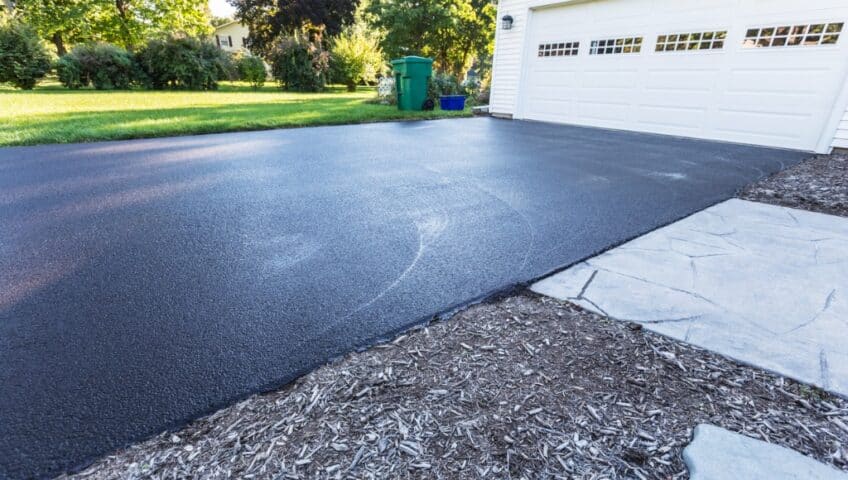
How to Maintain Your Asphalt Driveway
Your driveway is one of the first things that people notice about your home. It directly impacts your home’s curb appeal, whether you’re planning on selling or not. You want it to look its best and keep it safe for you, your family, and guests. Here are our best tips to making sure your asphalt driveway lasts a long time.
Why Choose Asphalt For Driveways?
Asphalt is a popular material for driveways because it is affordable, strong, durable, and low maintenance. In the winter, asphalt absorbs the sun’s rays, which helps the snow and ice melt faster.
Asphalt is less likely to crack than concrete, which increases its longevity. Compared to concrete, asphalt is quicker and easier to install. You can use asphalt much quicker. Even though the asphalt takes about 6 months to cure, it is dry enough to be used in just 2 to 3 days. Asphalt is generally laid in warmer weather, but it can be repaired any time of the year.
Why Does Asphalt Fail?
Knowing what causes asphalt to break down is one of the first steps toward good maintenance. Water is one of the biggest culprits, especially in winter. Ice and snow melt during the warmer temperatures of the day, then refreeze overnight. This can cause the base to break down or cause small cracks in the surface.
Heavy trucks on your driveway put stress on the driveway. Improper installation or using a subpar-quality asphalt can also cause your driveway to break down. Don’t wait to make repairs when you do see problems, because the issue is only going to get worse.
Proactive Maintenance For Your Driveway
It’s easy to get complacent about home maintenance, whether it’s the roof, plumbing, or your driveway repair. Fortunately, your asphalt driveway doesn’t require a lot of maintenance, but that doesn’t mean you should ignore it.
Regularly Inspect Your Driveway
At the beginning of every season, look for small cracks and minor imperfections that indicate the asphalt is breaking down. You will want to watch for potholes or surface raveling, which is when the surface starts to get rough and pitted.
Alligatoring is an area of asphalt that has a lot of interconnected breaks. It occurs when the asphalt is subjected to a lot of stress in one place. It could be from heavy equipment, but it might also happen when you park in the same place over and over. Getting these small repairs handled quickly will prevent further damage and keep your asphalt looking good.
Keep Your Driveway Clean
If car fluids get on your driveway, clean them up right away. Oil and antifreeze/coolant can cause a stain and deterioration of the asphalt. Keep leaves and dirt off the driveway. Tree sap can also be problematic. We recommend hosing your driveway off each month. Also, avoid using salt or chemical based de-icing agents. Potassium chloride is safer for the asphalt.
Check the Drainage
Standing water is the enemy of asphalt. After a rain or when using your sprinklers, check the driveway for any pools of water. If you’re seeing puddles on the driveway, you may need to ask an asphalt contractor to check the drainage system to find solutions to keep your driveway from being damaged by water.
Remove Weeds Quickly
Weeds may push through the asphalt. Don’t just pull them up, but use an herbicide to kill the roots. If you don’t get the weed at the root, it will continue to grow and push up the asphalt, which will cause small cracks.
Repair Cracks in the Driveway
A crack in the asphalt doesn’t just look bad; it’s also a hazard. Small cracks weaken the strength of the asphalt. These small cracks can be sealed. Larger cracks can be filled and then sealed, but if those cracks are larger than one-eighth inch wide, they will need to be cleaned first.
Check the Edges of the Asphalt for Deterioration
One of the weakest parts of the driveway is the edges, especially if there is no frame. You should avoid driving on the edges of the driveway. Topsoil and grass can help keep the edges in place, but you don’t want topsoil right up to the same height as the driveway. Set the topsoil about an inch below the driveway so that you have good drainage.
Apply a Sealant to Protect Your Asphalt
Every two to four years, you should expect to reseal the asphalt to protect it against damage and stains. Once an asphalt driveway is installed, it needs about 6 months to cure, or completely dry, before you can apply a sealcoating.
A sealcoating prevents the asphalt from drying out, which is called oxidizing. Asphalt that oxidizes will become more brittle and more prone to cracks. A sealcoating can improve the longevity of your driveway by many years. Make sure to get a quality sealcoating material that will do the job you need it to.
Professional Asphalt Paving and Maintenance Services
A driveway should have a lifespan of 20 to 30 years, but this depends on how well it was installed and how well you take care of it over time. South Central Sealing & Paving has over 30 years of experience laying asphalt driveways and parking lots in the greater Kansas area.
We use high-quality supplies and products according to the manufacturer’s specifications. Our experts carefully design a driveway that fits your terrain, and we lay the foundation correctly to prevent water damage. The structure of your asphalt driveway is vital to its longevity.
You can always call us with any questions or concerns about your driveway. We’re happy to provide a free estimate for installation, maintenance, and repairs. Contact us to get more information!


